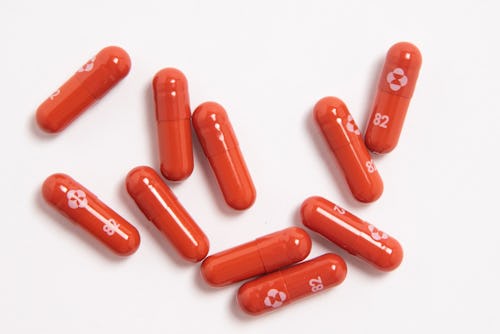What to know about Molnupiravir, the pill designed to treat COVID after infection
If authorized, the drug could be available by the end of this year.

Health experts have repeated the message like a steady drumbeat: Vaccination is the best form of protection against COVID-19. While that’s still true, breakthrough infections, though rare, are possible, and not every country has easy access to vaccines. To end the pandemic once and for all, we’ll need to rely on multiple strategies — which, according to the Washington Post, could include a pill shown to keep people with mild to moderate COVID out of the hospital. Here’s a quick rundown of the proposed treatment.
The pill, known as molnupiravir, is an antiviral created by pharma giant Merck in collaboration with Ridgeback Biotherapeutics, designed to prevent people with mild-to-moderate COVID from progressing to severe cases, the Post reported. Starting within five days of coming down with symptoms, they take the pill twice a day for five days. Molnupiravir works by making mistakes in the virus’s genetic material, RNA, per the Independent, which stops it from replicating like it normally would.
Molnupiravir’s had promising results. In an international clinical trial of 775 unvaccinated people who were elderly, obese, or had some other risk factor for severe disease, treatment with the pill slashed the risk of landing in the hospital or dying by around half, according to a press release from Merck. These findings have yet to be published in a peer-reviewed journal, though, Quartz said.
Merck said in the press release that the positive results from its clinical trial warranted stopping it early and submitting an Emergency Use Authorization application to the FDA. On November 30, an FDA committee will meet to discuss Merck and Ridgeback Biotherapeutics’s EUA request, meaning molnupiravir could be available in the U.S. by year’s end, per the Post. There are plans to apply for authorization to distribute it in other countries, too.
Merck and Ridgeback Biotherapeutics have already started manufacturing molnupiravir in anticipation of getting the go-ahead from the FDA, the Post said. The U.S. has secured 1.7 million treatments, while South Korea, Singapore, and Australia have also made advance purchases. In order to fast-forward the pill’s availability in low-and-middle-income countries, Merck has licensed it to a handful of generic drug companies in India. Since vaccines require refrigeration and people trained to inject them, molnupiravir could be used in low-income countries that lack a vaccine distribution infrastructure.
The fact that molnupiravir comes in pill form also gives it an edge over existing COVID treatments. Monoclonal antibodies, which are infused or injected, are expensive and challenging to administer, the Post pointed out. And although the antiviral remdesivir, which is injected, seems to shorten hospital stays, data on its effectiveness against other markers of infection, like severe illness and death, have been mixed. Doctors often use it in the ICU with the steroid dexamethasone, which lowered the risk of death by a third in placebo-controlled clinical trials.
But STAT noted that there are still some lingering questions about molnupiravir. Since it messes with RNA, some worry it could cause mutations, which, in turn, raises concern about birth defects, although Merck virologist Daria Hazuda said in a conference call for members of the press that Merck and Ridgeback Biotherapeutics “have seen no evidence of the potential for mutagenicity for this agent.” It’s also unclear whether molnupiravir will be used only in unvaccinated people, or those with breakthrough infections, as well.
Other companies, like Roche and Pfizer, are investigating similar treatments, the Independent reported. Doctors will probably prescribe multiple treatments together to protect COVID patients from severe disease and death.
Amid all this news, it’s absolutely crucial to remember that these proposed treatments are not meant to replace vaccination — which is still the most effective method for curbing the pandemic — but to be used alongside it. As STAT pointed out, a vaccinated person with a breakthrough infection who takes molnupiravir stands a better chance than an unvaccinated person who takes only the pill. Besides allowing molnupiravir to work better if you do happen to get a breakthrough infection, getting vaxxed is your best chance at preventing COVID, period.